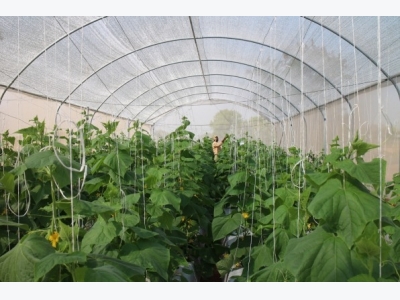Growing crops in greenhouses to promote sustainability

Over the years,Ginegar made a lot of effort to communicate globally that growing crops in greenhouses has a significant positive effect on the environment as it enables the production of higher yields (6 to 10 times the amount as compared to growing in open fields) with fewer resources.
Creating optimum growth conditions
One of the biggest advantages of greenhouses is the ability to achieve optimum growth conditions in any climactic zone – whether it be hot, cold, moderate or tropical – as compared to growing crops in open fields where climactic control is not possible. For example, peppers cannot be grown outside in winter due to the cold, but they can be grown in warmer conditions in greenhouses; and when it is too hot, dry or humid for certain crops in the summer, they can be grown in greenhouses under cooler controlled conditions.
The ability to control climactic conditions within greenhouses also reduces the risks associated with sudden weather fluctuations, thus giving growers confidence and predictability all year round !
Reduced amount of pesticides in greenhouses
New regulations are being introduced all the time that limit the amount of pesticides used to a predefined range. Growers are required to monitor all processes and produce crops to meet certain standardsfor residual chemicals.
As greenhouses and protected growing houses can reduce the use of pesticides required for crops, they give growers the confidence to meet these market requirements and regulations.
Ensuring nutritional value in developing countries
While greenhouses and protected growing houses are traditionally used for the commercial or large-scale cultivation of vegetables, fruit, flowers, and other crops, they can also help smaller growers to efficiently cultivate crops for their own personal use or smaller-scale consumption.
Important note about treatment of agricultural plastic waste
Agricultural plastic waste such as cover films, pipes, trellis twines and more may constitute an environmental hazard when not properly treated after usage.
The dumping of such agricultural waste on the periphery of fields can cause multiple environmental hazards, including soil pollution and air pollution (usually caused by the burning of such waste, which can also be a health hazard).
For this reason, after cover films are used, the plastic waste must be collected in a designated area and then treated according to each country’s regulations.
At Ginegar, we pride ourselves on finding the perfect match between a Ginegar solution and our customers’ needs, crops, climate and soil conditions. Leave your details if you have any questions for our expert agronomists.
Related news
 ‘Start-up nation’ meets Shavuot: the story of Israel’s efficient, high-tech dairy industry
‘Start-up nation’ meets Shavuot: the story of Israel’s efficient, high-tech dairy industry $15 billion acquisition of Mobileye, a lesser-known phenomenon is the high-tech and hyper-efficient Israeli dairy industry.
 Biologicals: Another important tool for farmers
Biologicals: Another important tool for farmers Biological pesticides and fertilizers are generating quite the buzz among farmers and the ag chem companies that serve them.
 New seed tech gets closer to market
New seed tech gets closer to market Balance GT offers another tool for managing resistant weeds, we talk to a new licensee - Stine Seed